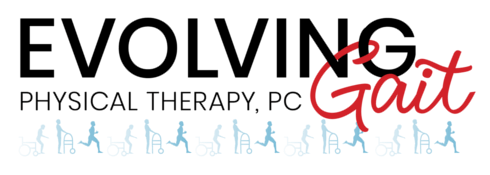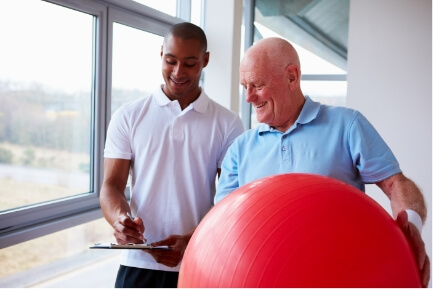Are You Living with a Balance or Gait Disorder? Physical Therapy Can Get You Back on Your Feet
One-third of the population over the age of 65 experiences a fall each year. Every 11 seconds, an older adult is rushed to the emergency room for a fall. Every 19 minutes, an older adult dies from a fall. Falls are the leading cause of both fatal and nonfatal injuries among older adults.
The risk of falling is serious, especially as age-related changes to strength, flexibility, and balance begin to occur in older adults. While these statistics may seem frightening, we can help improve your mobility and gait, in order to greatly reduce your risk of falling.
If you frequently notice an imbalance, dizziness, or unsteadiness that makes you feel as if you may fall over at any given time, it is a sign that you may be living with a balance or gait disorder. Balance disorders, and balance issues in general, all stem from the vestibular system.
The vestibular system is a delicate collection of fluid-filled chambers and sensory nerves located in the inner ear. Your vestibular system helps manage your “proprioception,” or sense of position, and when this is altered, it can be difficult to keep yourself steady.
Our innovative care strategies at Evolving Gait Physical Therapy will help you find quick relief. If you have been noticing issues with your balance, contact us today. We can help you figure out the root of your problem and treat it accordingly.
Why is my mobility not what it used to be?
Aging causes bones to shrink and muscles to lose their strength, making it more common for us to lose our balance and injure ourselves as we age.
In addition to age, there can be many causes of balance and gait disorders, as they can develop from many different underlying conditions – many of which can be exaggerated by age.
Some common vestibular conditions that may be adding to your mobility and gait issues include:
- Injury or ailment. Even if your brain and nervous system are working in harmony with one another, a sudden injury, disease, or other ailment causing muscle weakness can interfere with your balance and make it difficult to keep yourself upright.
- Neurological issues. This may include Parkinson’s disease, brain injury, or stroke. Anything that affects your neurological system can also impact your balance.
- Benign paroxysmal positional vertigo (BPPV). This occurs when calcium debris breaks off in the inner ear, causing issues with balance.
How will physical therapy help me?
As stated by VeryWell Health, “If you have fallen, then you understand how important it is to keep your balance as you walk or sit. Your physical therapist is a movement expert who can help you improve your balance so you can maintain safe functional mobility.”
Muscle weakness, especially around the hips and core, is often a primary contributing factor to poor balance and falls. With strength and balance training, patients are better equipped to recover from unexpected lapses in gait or a momentary loss of balance to prevent falls.
Perhaps one of the biggest aspects of your treatment plan will be gait training. Gait training will include activities to not only improve gait mechanics, but also increase your confidence and safety in navigating across different terrains and around different obstacles. Our physical therapists will also evaluate the need for an assistive device, or perhaps make modifications to a device you are currently using.
Both static and dynamic balance training will likely also be incorporated into your physical therapy treatment to help your body learn how to better respond to environmental challenges to their balance. For example, you may be asked to stand on one leg while performing a mentally-challenging task, such as reciting the alphabet or reading a paragraph of text out loud. Our physical therapists will also teach you balance strategies to help mitigate fall risk.
Endurance training may also be used, not just to improve muscle endurance for activity, but also to improve aerobic capacity for activity, both of which will reduce fatigue as a risk factor for falls when walking or completing daily tasks.
Contact us today for relief:
When you arrive for your initial consultation, one of our physical therapists will conduct a comprehensive physical evaluation to examine your balance, gait, stance, medical history, and symptoms, before creating a personalized treatment plan made for your specific needs.
Whatever the case may be, all treatment plans will contain targeted gait training and mobility exercises to help improve your core, vestibular system, and overall proprioception.
Are you ready to get back on your feet and move again with ease? Contact us today to schedule a consultation and get started!


